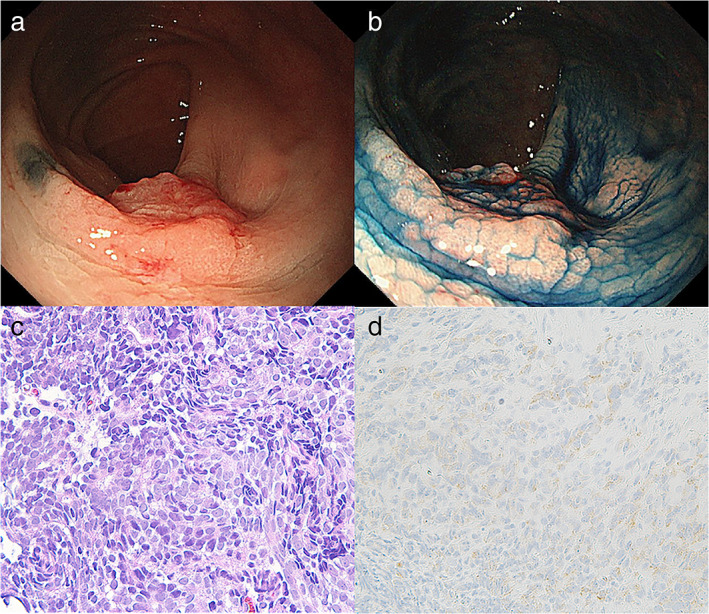Abstract
Solitary colorectal metastasis of prostate cancer is very rare, but the pathological features can closely resemble a primary colorectal cancer with poorly differentiated adenocarcinoma. Thus, metastasis of prostate cancer should be considered as a differential diagnosis in male patients with colorectal lesion with poorly differentiated adenocarcinoma.

Keywords: colorectal cancer, endoscopy, neoplasia
A 73‐year‐old man underwent colonoscopy for post‐polypectomy surveillance. He had a prostate cancer that was being treated with hormonal therapy. Laboratory tests demonstrated normal levels of serum CEA, CA19‐9, and PSA. Colonoscopy revealed a flat elevated lesion, 15 mm in size, in the rectum (Fig. 1a). Chromoendoscopy with indigo carmine clearly revealed a central depressive area of the lesion, which looked like an early rectal cancer (Fig. 1b). Endoscopic biopsy taken from the lesion revealed a poorly differentiated adenocarcinoma (Fig. 1c), and primary rectal cancer with poorly differentiated adenocarcinoma was initially suspected. However, immunohistochemical analysis revealed the tumor cells to be negative for CDX2, but positive for PSA (Fig. 1d). Magnetic resonance imaging ruled out direct invasion of prostate cancer into the adjacent rectal wall. Based on these findings, rectal metastasis of prostate cancer was finally diagnosed. The patient subsequently started chemotherapy.
Figure 1.

Colonoscopy revealed a flat elevated lesion, 15 mm in size, in the rectum (a). Chromoendoscopy with indigo carmine clearly revealed a central depressive area of the lesion (b). Endoscopic biopsy taken from the lesion revealed a poorly differentiated adenocarcinoma (c). Immunohistochemical analysis revealed the tumor cells to be positive for PSA (d).
Prostate cancer commonly metastasizes to the bones, lymph nodes, and liver, but metastasis to the digestive tract is very rare.1 In particular, solitary metastasis to the colorectum, such as in this case, has been reported in few cases.2 The pathological features of prostate cancer metastasizing to the colorectum can closely resemble a primary colorectal cancer with poorly differentiated adenocarcinoma. Thus, in such cases, it is very difficult to obtain an accurate diagnosis, especially based on a small biopsy sample, and immunohistochemical analysis can help to establish the diagnosis.3 Metastasis of prostate cancer should be considered as a differential diagnosis in male patients with colorectal lesion with poorly differentiated adenocarcinoma. Otherwise, misdiagnosis could result in inappropriate treatment strategies and lead to adverse consequences for the patient with prostate cancer.
Declaration of conflict of interest: The authors declare no conflict of interest.
Author contribution: Yasuhiko Hamada contributed to the patient care, conception, and drafting of the article. Yohei Ikenoyama, Youichirou Baba, Noriyuki Horiki, and Kyosuke Tanaka contributed to the critical revision of the article for important intellectual content. All authors have approved the final draft.
Data availability statement
All relevant data are within the manuscript.
References
- 1.Gandaglia G, Abdollah F, Schiffmann Jet al. Distribution of metastatic sites in patients with prostate cancer: a population‐based analysis. Prostate. 2014; 74: 210–6. [DOI] [PubMed] [Google Scholar]
- 2.Dulskas A, Cereska V, Zurauskas E, Stratilatovas E, Jankevicius F. Prostate cancer solitary metastasis to anal canal: case report and review of literature. BMC Cancer. 2019; 19: 374. [DOI] [PMC free article] [PubMed] [Google Scholar]
- 3.Lane Z, Epstein JI, Ayub S, Netto GJ. Prostatic adenocarcinoma in colorectal biopsy: clinical and pathologic features. Hum. Pathol. 2008; 39: 543–9. [DOI] [PubMed] [Google Scholar]
Associated Data
This section collects any data citations, data availability statements, or supplementary materials included in this article.
Data Availability Statement
All relevant data are within the manuscript.


